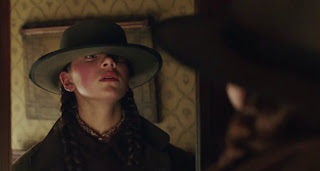
Rough and Ready
By Kevin Wong
Toward the end of “True Grit,” after deliberate delays, we finally get a look at Tom Chaney (Josh Brolin), the low down man who murdered 14-year-old Mattie’s (Hailee Steinfeld) father. He’s muddy, inebriated, and bleary eyed. He speaks with an absent-minded slur. He stumbles with the determination of a wino attempting to walk a straight line. And suddenly, it occurs to me that I am watching a portrayal of a ‘real drunk,’ sans any sort of irony or artistry. He’s not glamorized, Hollywood style, as a wayward rogue for his addictions, nor is his alcoholism used as a vicarious glimpse into his inner, evil devil. He is merely a pathetic, sad, little man, and the first thing that crossed my mind was “what a waste,” of his life and of Mattie’s father’s.
It's an insightful, inspired characterization in a film that is strangely careful. I say strangely, because it is decidedly against type for the Coen brothers to write and direct a film that fits so comfortably into its Western genre. Gone are the sly winks at the camera, the hyperbolized accents, the race-laden dialects, and the comedy of errors that make a Coens film a drama and a farce in equal measures.
The film is a classic tale of revenge. Mattie Ross is a tough as nails, morally rigid 14-year-old. She seeks justice for the murder of her father, and she hires Rooster Cogburn (Jeff Bridges), the meanest, drunkest U.S. Marshal she can find, to help her bring down Tom Chaney, the man who killed him. Joining this unlikely pair is LaBoeuf (Matt Damon), an ‘in over his head’ Texas Ranger who has been tracking Chaney for quite some time.
As the plot develops, the viewer gains a real sympathy for Mattie. Steinfeld gives a carefully wrought, award-worthy performance; she depicts Mattie as spunky and precocious without making her cloying and manipulative. Mattie is never anyone’s victim, even at her lowest moments. Her ethos is established very early on; she haggles with and threatens a man five times her age with nothing but words, and their 4-minute exchange, filmed in uncomfortable close-up, had me in stitches.

Bridges, Damon, and Brolin, all acting veterans, have the self-confidence and judiciousness to step back and allow Steinfeld to steal the show. Their performances are perfect support. Bridges, similar to Brolin, also plays his alcoholism for its realism rather than its dramatic qualities. Damon disappears into his role, playing his character as an understated, insecure man who talks bigger than he’s capable of.
Technically, “True Grit” is flawless, and it’s one of the better films this year. The acting is solid, the camera work is solid, the editing is solid (though the narrative lags slightly in the middle), and the plot, while stock, is well played. The photography is beautiful, depicting the West as both grimy and gorgeous. Is this enough, however, to make it a ‘great’ film?

In the past, the Coens have dealt with common, retread themes about the American heartland. They experimented, however, with tone to keep their films relevant and fresh. A couple of years ago, I was having a conversation with a friend about “No Country for Old Men” (2006), and he pointed out that thematically, it had a lot in common with “Fargo” (1996); both films dealt with the corrupting influence of ill gotten money, both include portrayals of capable law enforcers over their heads in trouble, and both have an atmosphere of pervasive dread. In “Fargo,” it’s the wide-angle shots of snow, and in “No Country for Old Men,” it’s the wide-angle shots of red dirt that make the viewer think, “Wow. This place is physically and spiritually dead.”
The two films, however, take different approaches to dealing with that sense of rural alienation. “Fargo” plays it for laughs, ramping up the ‘Minnesota nice’ and cloistered naivete of the characters to comedic effect. “No Country for Old Men” wallows in it, using silence for its soundtrack and painting its characters and settings as apocalyptic, complete with the long, black shadows that they cast. Neither approach is more effective than the other; both make these films modern classics in their own right.
“True Grit” deserves most of the accolades it has been receiving. It is not, however, a modern classic like its predecessors; its comparative lack of eccentricity has a way of holding it back from greatness. There are glimpses of transcendence; Chaney's characterization is unique, and Rooster’s tear jerking, midnight ride to save Mattie’s life takes place underneath an eerie blanket of stars. The epilogue, depressing in its lack of resolution, is appropriate, though thoroughly aggravating. The film’s score is variations on the gospel hymn “Leaning on the Everlasting Arms,” a bold choice that complements the violent, rugged action perfectly.
Ultimately, however, “True Grit” does not add something new to the Western genre. The viewer never sees the characters’ quirks and eccentricities, for better or for worse; the film is overly earnest and forthright in its motives, and the characters are a little too safe and a little too static. Some critics have lauded this simpler, back-to-basics approach, which is a throwback to Old Hollywood storytelling, but I disagree. It’s 2011, and the tropes of the West have been overly established. The Coens have made a ‘perfect Western,’ but ironically (and contextually), this is the very thing that also makes it flawed.